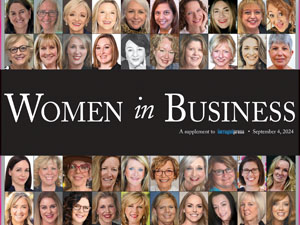Town’s NEDC special for ‘687 births,’ not just ‘24-year’ embryo-to-birth
A Farragut facility dedicated to helping childless couples realize the dream of parenthood recently was in the national spotlight — but for its staff it was just another miracle of modern technology they have facilitated for nearly 15 years.
Since 2003, the non-profit National Embryo Donation Center has been a conduit between preserved embryos and couples throughout North America.
The birth of Emma Wren Gibson Nov. 25, to parents Benjamin and Tina Gibson, was in the spotlight because she was the result of an embryo created 24 years ago.
“Worldwide, there has not been a recorded birth from human embryos frozen for this length of time,” Carol Sommerfelt, NEDC’s embryologist, said.
However, entering 2018 there were 687 babies born with NEDC embryos — with more on the way.
“That is one thing I constantly tell people, that here is an amazing global story, but [the NEDC] has had a hand in more babies being born than any other [organization of this type],” said Mark Mellinger, the facility’s marketing and development director.
Rachel and Gregory Cox of Greenville are another set of thrilled parents with 6-month-old triplets Leora, Annalyn and Jayla Rae thanks to NEDC. They have a son, Bryce, who came to the family through traditional adoption after failing to conceive through In Vitro Fertilization. They were going to adopt a second time, but “we did a lot of praying and just felt like [embryo adoption] was what we were supposed to do,” Rachel Cox said.
“It [having our own babies] is indescribable,” she added. “It has just been a tremendous blessing.”
Rachel Cox said the NEDC staff “was so sweet, and understanding…everyone was as caring as they could be.”
It is that approach that has contributed to the NEDC’s success.
“We follow the golden rule, pure and simple,” explained Dr. Jeffrey Keenan, NEDC president and medical director. “Of course, competence and excellent results are necessary, but in the absence of compassion and appropriate care, neither clinicians nor patients will remain fully satisfied.”
Helping the center’s effort is the generosity of individuals who have extra embryos created when they themselves had undergone IVF.
The NEDC began at Baptist Hospital for Women in 2003, with the cooperation of the Christian Medical and Dental Association, BHSET, Bethany Christian Services and Keenan’s own practice, the Southeastern Center for Fertility and Reproductive Surgery, which began 22 years ago. He also was assisted by Sommerfelt, who has been an embryologist since 1990 and worked with IVF technology and embryology on animal subjects prior to that.
“We saw a real need for [what to do with extra embryos] that are held in limbo,” Sommerfelt said, noting about 400,000 embryos were in that category when the NEDC began and estimated there are close to 1 million today.
Typically, three options are available for couples that have leftover embryos, she explained: “They can donate them to research, discard them or donate them to other infertile couples.”
“That third option has not always been offered or even mentioned,” Sommerfelt added, noting NEDC received federal funding/grants early on to help educate physicians, facilities, potential donors and recipients on that possibility.
Currently, NEDC has about 600 sets of embryos comprised of “as few as one, or 10 or more,” Sommerfelt said, adding the facility receives embryos or contacts about prospects “daily.”
The facility performs about 30 transfers every other month, resulting in 120 to 150 annually.
Not all implants are successful, but NEDC has about a 62 percent success rate — higher than the national average of around 50 percent.
Cost is around $10,000 for the process, almost half of traditional IVF, which is estimated to cost around $17,000.
As the business has continued to grow, Sommerfelt and Keenan are looking to expand.
“We are going to have to expand one way or another, to help everybody,” Sommerfelt said.
Both are thrilled they are able to help so many couples in need.
“I have been given a gift, to be able to work in this industry. And it is not just my abilities,” Sommerfelt said. “I say, ‘I see miracles happen all the time.’
“Ultimately, the end result is what keeps us going,” she added.
“The NEDC and its patients bring us immense joy and professional satisfaction, because often these couples have failed all other traditional treatments and yet are able to conceive with embryo adoption,” Keenan said. “Their gratitude and joy are infectious.”
Recipients may search for specific qualities and characteristics. A variety of races and ethnicities are options, and three attempts to successfully implant are allowed.
A typical time frame from application to actual implantation is about nine months, which includes a mandatory Home Study performed by a licensed social worker or adoption agency.
“We are the only agency that covers all aspects of the process – from medical, legal and social standpoints,” Sommerfelt said.
Both the donors and the recipients may decide on open or closed “adoption.” That term is used, but legally, once the embryo is implanted, it belongs to the recipients, Sommerfelt said.
SE Fertility and NEDC are located it the same building, which fronts Kingston Pike just east of Concord Road, and the two share the medical side of the business, which includes procedures and lab space.
Both organizations are very open about the Christian beliefs that guide both practices.
“The NEDC is a faith-based” organization,” Sommerfelt said. “We do not limit our practice to just Christian couples, even though the employees of the NEDC are all Christian and believe all these embryos need to be given the best chance to be born as children.”
“We all started as human embryos and it is this knowledge and the realization that we must protect life at all stages which got me involved in this work,” agreed Dr. Keenan.
As the business has continued to grow, Sommerfelt and Keenan are looking to expand.
“We are going to have to expand one way or another, to help everybody,” Sommerfelt said.
Both are thrilled they are able to help so many couples in need.
“The NEDC and its patients bring us immense joy and professional satisfaction, because often these couples have failed all other traditional treatments and yet are able to conceive with embryo adoption,” Keenan said. “Their gratitude and joy are infectious.”
“I have been given a gift, to be able to work in this industry; and it is not just my abilities, but is being able to help couples achieve their dreams of having a family,” Sommerfelt said. “I say, ‘I see miracles happen all the time.’
“Ultimately, the end result is what keeps us going.”


